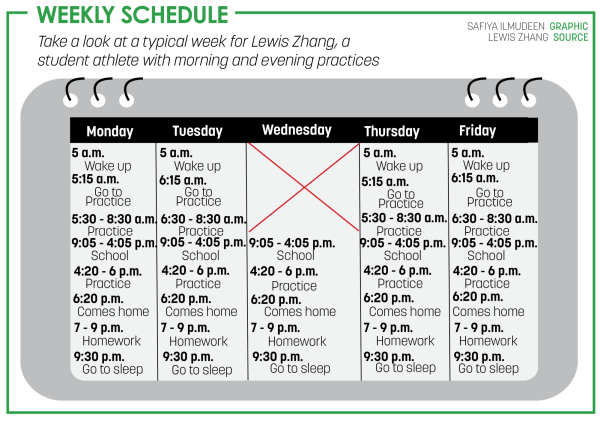
For Lewis Zhang, member of men’s swimming and diving team and sophomore, most mornings are not for sleeping in. As many practices for swimmers occur in the morning, they have become an integral part of his daily routine.
As such, Zhang said that the importance of time management has been apparent since those morning practices began.
“I try to get all my homework done really fast so I can sleep,” Zhang said. “Keeping track of time and using time management is really important.”
Payton Clark, member of women’s swimming and diving and freshman, said time management has also become vital to maintaining her sleep schedule.
“Balancing sleep and school is hard at times,” Clark said. “I’ve learned this year that I need to take my SSRT time seriously because I need to go to bed earlier. I also try to get ahead on my work so that I don’t have to do it all in one day.”
Clark said there are certain aspects of her life that she has had to sacrifice because of her early morning practices.
“A trade off I have definitely had to make (for morning practice) is time with my friends,” Clark said. “I’ve had to turn down hanging out with people multiple times because I’ve known I needed to sleep or do work (before morning practice).”
Zhang said he also has had to make certain trade offs.

“Sometimes I’ll just sacrifice sleep or studying time; it’ll be one of the two,” Zhang said. “Most of the time I’ll sacrifice studying time to get more sleep before practice because getting enough sleep in the day is really important.”
Chris Plumb, head coach of Carmel Swim Club and the CHS swimming teams, said contrary to popular belief, morning practices are actually beneficial for sleep if athletes manage their time correctly.
“Turns out, morning practices can actually up your sleep quality by dancing in tune with your body’s natural rhythm,” Plumb said. “To dodge the potential downsides, stick to a snooze schedule, cultivate a pre-bed chill routine and create a sleep-friendly sanctuary.”
Still, Plumb said he agreed with the perspective that morning practice could cause athletes to compromise other aspects of their lives.
“Morning practice may clash with academic or work commitments, leading to stress and potential compromise in other areas of life,” Plumb said. “(Athletes should) develop effective time management skills to balance academic, athletic and personal commitments.”
Regardless of the drawbacks, both Clark and Zhang said they find the benefits of morning practices outweigh the drawbacks.
“In my group, we do our hardest practices in the morning so you just get it out of the way really early so then you just have the afternoon to relax and chill,” Zhang said. “I like morning practices better than afternoon practices because I feel better in the water, even though it sucks to wake up really early.”
Clark said she shares a similar sentiment.
“I would rather have morning practice than evening practice because with morning practice, I still have time at night to get all my work done, and hang out with friends,” Clark said. “Once I’m done with afternoon practice, I feel like I don’t have time to do anything else that night. (Morning practice) also makes me more awake for my first class (but) by last block, I feel more tired and done for the day.”
Plumb said he finds morning practice to be beneficial for the athlete in terms of productivity throughout the day.
“Morning workouts aren’t just about the sweat; they’re also about keeping your energy levels up all day long,” Plumb said. “Exercise dishes out endorphins, promoting wakefulness and positivity.”

































![AI in films like "The Brutalist" is convenient, but shouldn’t take priority [opinion]](https://hilite.org/wp-content/uploads/2025/02/catherine-cover-1200x471.jpg)










































![Review: “The Immortal Soul Salvage Yard:” A criminally underrated poetry collection [MUSE]](https://hilite.org/wp-content/uploads/2025/03/71cju6TvqmL._AC_UF10001000_QL80_.jpg)
![Review: "Dog Man" is Unapologetically Chaotic [MUSE]](https://hilite.org/wp-content/uploads/2025/03/dogman-1200x700.jpg)
![Review: "Ne Zha 2": The WeChat family reunion I didn’t know I needed [MUSE]](https://hilite.org/wp-content/uploads/2025/03/unnamed-4.png)
![Review in Print: Maripaz Villar brings a delightfully unique style to the world of WEBTOON [MUSE]](https://hilite.org/wp-content/uploads/2023/12/maripazcover-1200x960.jpg)
![Review: “The Sword of Kaigen” is a masterpiece [MUSE]](https://hilite.org/wp-content/uploads/2023/11/Screenshot-2023-11-26-201051.png)
![Review: Gateron Oil Kings, great linear switches, okay price [MUSE]](https://hilite.org/wp-content/uploads/2023/11/Screenshot-2023-11-26-200553.png)
![Review: “A Haunting in Venice” is a significant improvement from other Agatha Christie adaptations [MUSE]](https://hilite.org/wp-content/uploads/2023/11/e7ee2938a6d422669771bce6d8088521.jpg)
![Review: A Thanksgiving story from elementary school, still just as interesting [MUSE]](https://hilite.org/wp-content/uploads/2023/11/Screenshot-2023-11-26-195514-987x1200.png)
![Review: "When I Fly Towards You", cute, uplifting youth drama [MUSE]](https://hilite.org/wp-content/uploads/2023/09/When-I-Fly-Towards-You-Chinese-drama.png)
![Postcards from Muse: Hawaii Travel Diary [MUSE]](https://hilite.org/wp-content/uploads/2023/09/My-project-1-1200x1200.jpg)
![Review: "Ladybug & Cat Noir: The Movie," departure from original show [MUSE]](https://hilite.org/wp-content/uploads/2023/09/Ladybug__Cat_Noir_-_The_Movie_poster.jpg)
![Review in Print: "Hidden Love" is the cute, uplifting drama everyone needs [MUSE]](https://hilite.org/wp-content/uploads/2023/09/hiddenlovecover-e1693597208225-1030x1200.png)
![Review in Print: "Heartstopper" is the heartwarming queer romance we all need [MUSE]](https://hilite.org/wp-content/uploads/2023/08/museheartstoppercover-1200x654.png)



